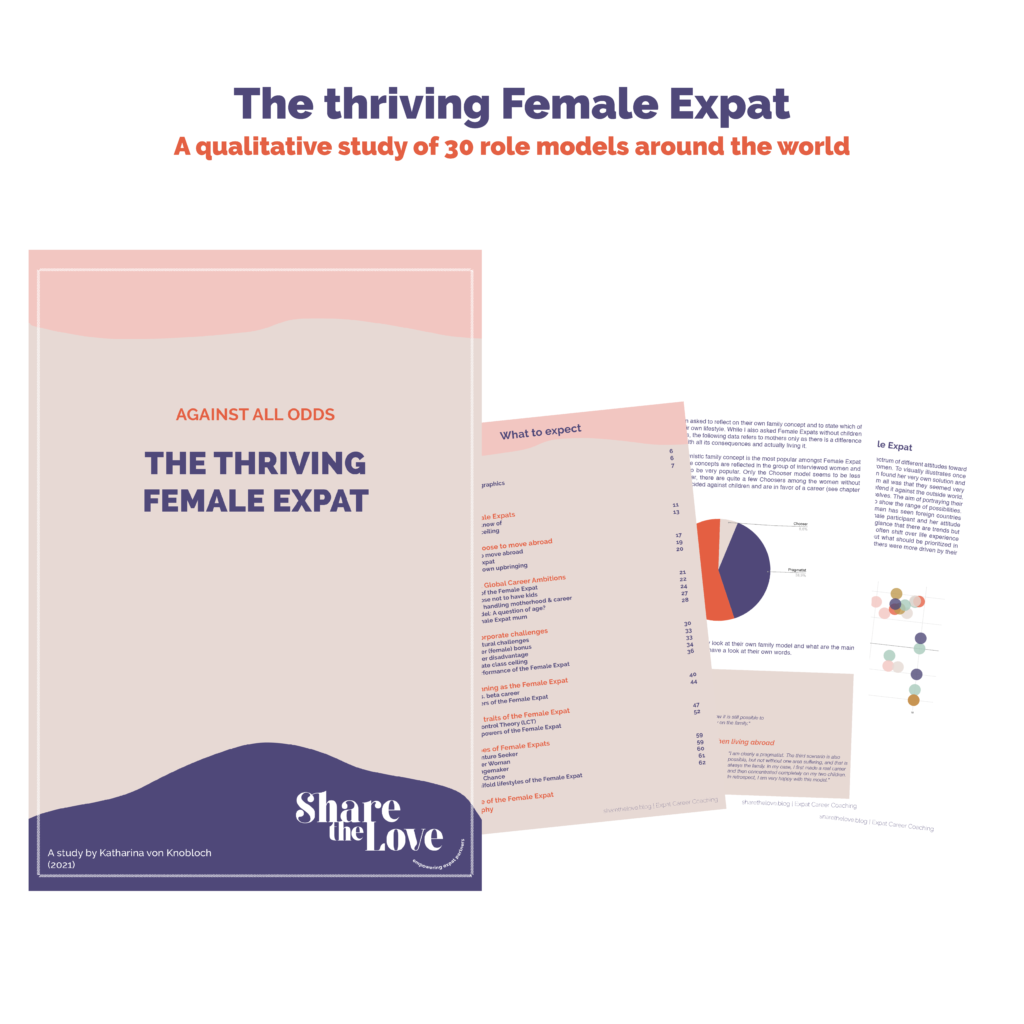
Female Expats and Their Perspectives on International Assignments
Text by: Kate von Knobloch
The distribution of genders in international assignments reveals that parity is still far from reality. As of today, women are less frequently sent abroad, with female expats making up only 32% in 2020, contrary to the originally more optimistic forecasts by global mobility experts (SantaFe, 2019 & 2020).
The reasons for this disparity are varied, ranging from higher risk assessments by corporations, challenges in balancing family and international careers, to lower acceptance of female leaders abroad.
However, it is particularly fascinating to explore the experiences of women who have chosen to pursue global careers and have successfully established themselves overseas. In my study, “The Thriving Female Expat,” I interviewed 30 successful women expatriates and investigated how they shattered the global glass ceiling and the challenges they faced.
Balancing Family and International Career
Living abroad tests many families and requires a delicate touch in integration. Most women in the study emphasized the essential role of their partners as supporters. Arrangements where one parent puts their career on hold for a time, or a complete focus on the mother’s career, were common. Single mothers also shared their journeys, benefiting from generally lower childcare costs abroad and increased acceptance of working mothers in society. The variety of compatibility strategies among female expats is vast, and not every approach is equally desired. While some choose to quit their jobs when their children reach a certain age, others move continents and employers with a four-month-old baby as a single parent. Female expats hold both admiration and incomprehension for mothers who decide to prioritize their children’s needs over their careers.
The Need for Female Expats to Prove Themselves
Many women experience workplace discrimination in their home countries throughout various stages of their careers. This discrimination often follows them when they accept positions abroad, where they typically find themselves in unique and challenging situations, often as the only woman in professional environments. To overcome these challenges and earn the trust of their colleagues and clients, these female expats frequently demonstrate exceptional commitment and consistently deliver exemplary work. This dedication not only helps to establish their credibility but also fosters a professional respect that might not be as readily afforded to their male counterparts. They often assess their job performance as at least equal to, if not superior to, that of their male peers, frequently attributing this to a higher level of education and a strong work ethic. This scenario highlights the ongoing struggles and triumphs of women in global workspaces, underscoring their resilience and determination to succeed despite systemic barriers.

Empowering Self-Reliance: Charting Independent Career Paths Abroad
Consequently, many women are increasingly opting against traditional corporate assignments and instead searching for local employment opportunities abroad (self-initiated expats). Often, they accept a temporary step back in their careers, which, for the interviewed women, usually pays off in the medium term. While some seek more adventure and variety from life abroad, others choose this path to advance their careers deliberately. The vast majority of interviewed female expats exhibit great confidence, shaped by their experiences of going against the flow and living a different family model compared to their friends and family back home.
Looking into the Crystal Ball of Female Expatriation
While the proportion of female expats has historically been lower than that of their male counterparts, recent data from 2023 indicates a promising shift towards greater gender parity in global assignments. According to a 2023 Global Mobility Report, the percentage of women in international roles has risen to 38%, marking a steady increase from previous years. This trend is expected to continue, with projections for 2024 suggesting that organizations are increasingly committing to diversity and inclusion initiatives that facilitate more equitable gender representation in overseas positions.
In addition, sectors such as technology and healthcare are leading the way in achieving gender balance, with both industries reporting a significant uptick in female participation in expatriate programs. Public sector organizations are also showing substantial progress, with many setting specific targets for female expat inclusion as part of their broader equality agendas.
However, despite these positive trends, challenges remain. Many women still report significant hurdles related to dual-career situations and family responsibilities, which can impede their willingness or ability to accept international assignments. Furthermore, the 2023 data underscores a persistent gap in the support systems available to female expatriates, particularly in terms of spousal support and career integration services, which are crucial for sustaining long-term expat assignments.
These evolving dynamics suggest a complex but gradually improving landscape for female expatriates, as organizations and industries adapt to the needs of a diversifying global workforce. As we look to 2024 and beyond, the continued focus on strategic diversity initiatives and support mechanisms will be key to fully unlocking the potential of female professionals on the global stage.
I hope you found this blog post helpful for your current situation. Let me know if I can be of any help! I offer the opportunity for free 1:1 discovery calls to discuss your situation and I also offer free monthly global coffee dates where women from all around the world meet to discuss their global lifestyle decisions. You can safe your spot here.

Do you know anyone who might find this helpful? Share the Love by sharing this article
Ebook for the accompanying partner
Quitting your job and joining your partner abroad does not need to end your professional career. Learn what options you have and how to define what you really want during your time abroad. Make it to your own personal journey and get the most out of it!











